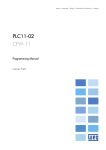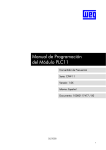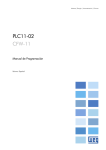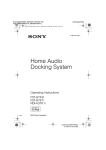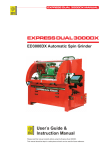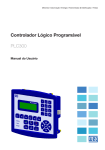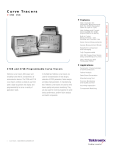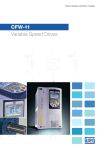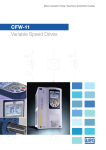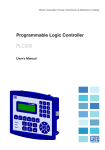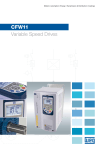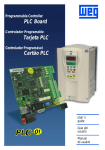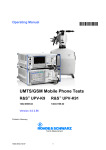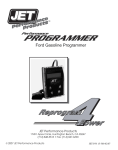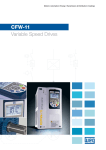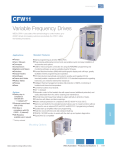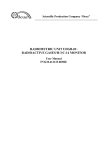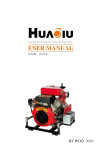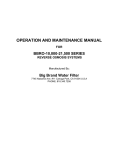Download PLC11-01 Module Programming Manual
Transcript
PLC11 Module Programming Manual Frequency Inverter Series: CFW-11 Version: 1.0X Language: English Document: 10000118422 / 00 05/2008 Summary 1 SAFETY INSTRUCTIONS........................................................................................................................6 1.1 1.2 1.3 2 SAFETY WARNINGS IN THE MANUAL .......................................................................................... 6 SAFETY WARNINGS IN THE PRODUCT ......................................................................................... 6 PRELIMINARY RECOMMENDATIONS ............................................................................................ 6 GENERAL INFORMATION.....................................................................................................................8 2.1 ABOUT THE MANUAL...................................................................................................................... 8 ABBREVIATIONS AND DEFINITIONS .................................................................................................................. 8 NUMERICAL REPRESENTATION .......................................................................................................................... 8 2.2 COMPATIBILITY ................................................................................................................................ 8 3 INTRODUCTION TO THE PLC11...........................................................................................................9 3.1 4 SYMBOLS AND DATA TYPES........................................................................................................... 9 PLC11 MEMORY ................................................................................................................................10 4.1 4.2 USER DATA MEMORY..................................................................................................................... 10 PHYSICAL INPUTS AND OUTPUTS (HARDWARE) ..................................................................... 10 4.2.1 Analog Inputs.......................................................................................................................... 10 4.2.2 Analog Outputs....................................................................................................................... 11 4.3 SYSTEM MARKERS .......................................................................................................................... 11 5 PARAMETER SETTINGS .......................................................................................................................14 5.1 5.2 5.3 5.4 CFW-11 CONFIGURATION PARAMETERS .................................................................................. 14 PLC11 PARAMETERS....................................................................................................................... 14 ALARM DESCRIPTION.................................................................................................................... 30 FAULT DESCRIPTION ..................................................................................................................... 32 2 Quick Parameter Reference Description [Type] Parameter Adjustable range Factory setting User setting Proprieties Page P1200 PLC11 Firmware Version 0 to 655.35 - - RO 14 P1201 PLC11 Status 0 = No Program 1 = Saving the Program 2 = Copy Memory Card 3 = Invalid Program 4 = Stopped Program 5 = Running Program - - RO 15 P1202 Scan Cycle 0.0 to 6553.5 ms - - RO 15 P1205 Actual Position (sign) 0 = Negative 1 = Positive - - RO 15 P1206 Actual Position (turns) -32768 to 32767 revolutions - - RO 16 P1207 Actual Position (fraction) 0.0 to 359.9º - - RO 16 P1208 Lag 0.0 to 6553.5º - - RO 16 P1215 DI109 to DI101 Status 0000 to 01FFh - - RO 16 P1216 DO106 to DO101 Status 0000 to 003Fh - - RO 17 P1217 AI101 Value -100.00 to 100.00 % - - RO 17 P1218 AO101 Value -100.00 to 100.00 % - - RO 17 P1219 AO102 Value -100.00 to 100.00 % - - RO 18 P1220 CAN Status 0 = Inactive 1 = Auto-baud 2 = CAN Active 3 = Warning 4 = Error Passive 5 = Bus Off 6 = No Bus Power - - RO 18 P1221 Received CAN Telegrams 0 to 65535 - - RO 18 P1222 Transmitted CAN Telegrams 0 to 65535 - - RO 18 P1223 Occurred CAN Errors 0 to 65535 - - RO 19 P1224 Lost CAN Telegrams 0 to 65535 - - RO 19 P1225 CANopen Configuration State 0 = Slave 1 = Master - - RO 19 P1226 CANopen Network Status 0 = Inactive 1 = Reserved 2 = Communication Enabled 3 = Error Control Enabled 4 = Guarding Error 5 = Heartbeat Error - - RO 20 P1227 CANopen Node Status 0 = Inactive 1 = Initialization 2 = Stopped 3 = Operational 4 = Preoperational - - RO 20 P1250 PLC11 Command 0 = Stop Program 1 = Run Program 2 = Delete Program 1 - 20 P1251 DI108 Interruption Enabling 0 = Disabled 1 = Falling Edge 2 = Rising Edge 0 - 21 3 Quick Parameter Reference Parameter Description [Type] P1252 DI109 Interruption Enabling 0 = Disabled 1 = Falling Edge 2 = Rising Edge P1253 Time Interruption Period 0 to 65535 ms P1254 PLC11 Watchdog 0 to 200 ms P1255 Retentive Marker Reset 0 = Disabled 1 = Resets Markers P1256 Load Parameters P1257 Adjustable range Factory setting User setting Proprieties Page 0 - 21 0 - 21 200 - 22 0 - 22 0 = Disabled 1 = Loads Default 0 - 22 Copy Function Memory Card 0 = Disabled 1 = Restore Program 2 = Restore Parameters 3 = Restore CAN 0 - 22 P1259 Maximum Lag 0.0 to 6553.5 º 180.0 - 23 P1260 Kp – Proportional Positioning Gain 0 to 200 50 - 23 P1262 Main Encoder Resolution 0 to 4096 ppr 1024 - 23 P1263 Main Encoder Zero Pulse 0 to 359.9 º 0.0 - 24 P1264 Main Encoder Direction 0=A→B 1=B→A 1 - 24 P1265 Auxiliary Encoder Resolution 0 to 4096 ppr 1024 - 24 P1266 Auxiliary Encoder Zero Pulse 0 to 359.9 º 0.0 - 24 P1267 Auxiliary Encoder Direction 0=A→B 1=B→A 1 - 25 P1268 Auxiliary Encoder Position Feedback 0 = Disabled 1 = Enabled 0 - 25 P1270 AI101 Gain 0.000 to 9.999 1.000 - 25 P1271 AI101 Signal 0 = 0 to 10 V / 20mA 1 = -10 to 10 V 2 = 4 to 20 mA 0 - 25 P1272 AI101 Offset -100.00 to 100.00 % 0.00 - 26 P1273 AI101 Filter 0.00 to 16.00 s 0.00 - 26 P1274 AO101 Gain 0.000 to 9.999 1.000 - 26 P1275 AO101 Signal 0 = 0 to 10 V 1 = -10 to 10V 2 = 0 to 20 mA 3 = 4 to 20 mA 0 - 26 P1276 AO102 Gain 0.000 to 9.999 1.000 - 27 P1277 AO102 Signal 0 = 0 to 10 V 1 = -10 to 10V 2 = 0 to 20 mA 3 = 4 to 20 mA 0 - 27 P1280 Serial Protocol 0 = TP 1 = Modbus RTU 1 - 27 P1281 Serial Address 1 to 247 1 - 28 P1282 Serial Baud Rate 0 = 1200 bits/s 1 = 2400 bits/s 2 = 4800 bits/s 3 = 9600 bits/s 3 - 28 4 Quick Parameter Reference Parameter Description [Type] Adjustable range Factory setting User setting Proprieties Page 4 = 19200 bits/s 5 = 38400 bits/s P1283 Serial Bytes Config. 0 = 8 bits, no, 1 1 = 8 bits, even, 1 2 = 8 bits, odd, 1 3 = 8 bits, no, 2 4 = 8 bits, even, 2 5 = 8 bits, odd, 2 0 - 28 P1285 CAN Protocol 0 = Disabled 1 = CANopen 0 - 29 P1286 CAN Address 0 to 127 63 - 29 P1287 CAN Baud Rate 0 = 1 Mbit/s 1 = Reserved 2 = 500 Kbit/s 3 = 250 Kbit/s 4 = 125 Kbit/s 5 = 100 Kbit/s 6 = 50 Kbit/s 7 = 20 Kbit/s 8 = 10 Kbit/s 0 - 29 P1288 CAN Bus off Recovery 0 = Manual 1 = Automatic 0 - 29 P1289 CAN Error Action 0 = Indicate Alarm 1 = Cause Fault 0 - 30 P1300 User Parameters 0000 to FFFFh 0 - 30 M P1499 Note: RO = Read-only parameter 5 Safety Instructions 1 SAFETY INSTRUCTIONS This Manual contains the information necessary for the correct use of the CFW-11 variable frequency drive with the PLC11 expansion board. It has been developed to be used by qualified personnel with suitable training or technical qualification for operating this type of equipment. 1.1 SAFETY WARNINGS IN THE MANUAL DANGER! The nonobservance of the procedures recommended in this warning can lead to death, serious injuries or considerable equipment damage. ATTENTION! The nonobservance of the procedures recommended in this warning can lead to equipment damage. NOTE! The text aims at to supply important information for the correct understanding and good operation of the product. 1.2 SAFETY WARNINGS IN THE PRODUCT The following symbols are attached to the product as safety notes: High voltages are present. Components sensitive to electrostatic discharge. Do not touch them. Mandatory connection to the protective earth (PE) Connection of the shield to the ground. Hot surface. 1.3 PRELIMINARY RECOMMENDATIONS DANGER! Only qualified personnel familiar with the CFW-11 variable frequency drive and associated equipment should plan or implement the installation, start-up and subsequent maintenance of this equipment These personnel must follow all the safety instructions included in this Manual and/or defined by local regulations. Failure to comply with the safety instructions may result in death, serious injury, and equipment damage. 6 Safety Instructions NOTE! For the purpose of this manual, qualified personnel are those trained and able to: 1. Install, ground, power-up, and operate the CFW-11 according to this manual and to the current legal safety procedures; 2. Use the protection equipment according to the established regulations; 3. Provide first aid. DANGER! Always disconnect the input power before touching any electrical component associated to the inverter. Many components can remain charged with high voltages or remain in movement (fans) even after that AC power is disconnected or switched off. Wait at least 10 minutes to assure a total discharge of the capacitors. Always connect the equipment frame to the protection earth (PE) at the suitable connection point. ATTENTION! Electronic boards have components sensitive to electrostatic discharges. Do not touch directly on components or connectors. If necessary, touch the grounded metallic frame before or use an adequate grounded wrist strap. Do not perform any high pot test with the inverter. If necessary, consult WEG NOTE! Read the User Manual completely before installing or operating the CFW11. 7 General Information 2 GENERAL INFORMATION 2.1 ABOUT THE MANUAL This manual provides the necessary description for the operation of the CFW-11 frequency inverter using the PLC11 expansion board. It must be used together with the CFW11 user manual and the WLP software manual. Abbreviations and Definitions PLC CRC RAM WLP USB Programmable Logic Controller Cycling Redundancy Check Random Access Memory Ladder language programming software Universal Serial Bus Numerical Representation The decimal numbers are represented by means of digits without suffix. Hexadecimal numbers are represented with the letter “h” after the number. 2.2 COMPATIBILITY PLC11 V1.0X – CFW11 V1.3X or a version higher. 8 Introduction to the PLC11 3 INTRODUCTION TO THE PLC11 The PLC11 is an expansion board that can be fitted into the CFW-11, adding the functionalities of a PLC and a positioning control to the CFW-11. The PLC11 main features are: Ladder language programming, by using the WLP software; Access to all the CFW11 parameters and I/O’s; 200 configurable user parameters; PLC, Mathematical, control, positioning and Movement blocks; Applicative software transfer and online monitoring via USB; Transfer of the installed applicative software to the PC conditioned to a password; Backup of the applicative software in the FLASH memory card. 3.1 SYMBOLS AND DATA TYPES %KW %KF %MX %MW %MF %SX %SW %IX %IW %QX %QW %UW %PW %PD %PM %RW %WW %RB %WB %RS %WS word type constants (16 bit) float type constants (32 bit floating point) bit marker word marker (16 bit) float marker (32 bit floating point) system bit marker system word marker (16 bit) digital inputs analog inputs (16 bit) digital outputs analog outputs (16 bit) user parameters (16 bit) PLC11 system parameters (16 bit) drive parameters (16 bit) user block parameters (32 bit) CANopen network reading word marker (16 bit) CANopen network writing word marker (16 bit) CANopen network reading byte marker (8 bit) CANopen network writing byte marker (8 bit) CANopen network reading status word marker (16 bit) CANopen network writing command word marker (16bit) 9 PLC11 Memory 4 PLC11 MEMORY The maximum size of applicative software is 327,680 bytes. 4.1 USER DATA MEMORY Table 4.1 - User Date Memory Map Sym. %MX %MX %MW %MW %MF %MF %UW %RW %WW %RB %WB Description Retentive bit markers Volatile bit markers Retentive word markers Volatile word markers Retentive float markers Volatile float markers User parameters CANopen network reading word markers CANopen network Writing word markers CANopen network reading Byte markers CANopen network Writing Byte markers Range 6100 ... 6483 6500 ... 7987 8200 ... 8399 8400 ... 8999 9200 ... 9399 9400 ... 9999 1300 ... 1499 4200 ... 4299 4600 ... 4699 4400 ... 4499 4800 ... 4899 4.2 PHYSICAL INPUTS AND OUTPUTS (HARDWARE) Table 4.2 - I/O Memory Maps Sym. %IX %IX %QX %QX %IW %IW %QW %QW Description CFW11 digital inputs PLC11 digital inputs CFW11 digital outputs PLC11 digital outputs CFW11 analog inputs PLC11 analog inputs CFW11 analog outputs PLC11 analog outputs Range 1 ... 6 101 ... 109 1 ... 3 101 ... 106 1 ... 2 101 ... 101 1 ... 2 101 ... 102 NOTE! %IX108 and %IX109 (PLC11 digital inputs 8 and 9) are fast digital inputs and detect up to 10kHz pulses. 4.2.1 Analog Inputs Table 4.3 - Parameters Related to the Analog Inputs Sym. %IW1 Description CFW11 Analog Input 1 (1 sign bit + 15 bits) %IW2 CFW11 Analog Input 2 (1 sign bit + 15 bits) %IW101 PLC11 Analog Input 1 (1 sign bit + 15 bits) Related Parameters P0231: Function P0232: Gain P0233: Signal P0234: Offset P0235: Filter P0236: Function P0237: Gain P0238: Signal P0239: Offset P0240: Filter P1270: Gain P1271: Signal P1272: Offset P1273: Filter 10 PLC11 Memory 4.2.2 Analog Outputs Table 4.4 - Parameters Related to the Analog Outputs Sym. %QW1 Description CFW11 Analog Output 1 (1 sign bit + 15 bits) %QW2 CFW11 Analog Output 2 (1 sign bit + 15 bits) %QW101 PLC11 Analog Output 1 (1 sign bit + 15 bits) PLC11 Analog Output 2 (1 sign bit + 15 bits) %QW102 Related Parameters P0251: Function P0252: Gain P0253: Signal P0254: Function P0255: Gain P0256: Signal P1274: Gain P1275: Signal P1276: Gain P1277: Signal 4.3 SYSTEM MARKERS Table 4.5.a - Memory Map of the System Bit Markers - Odd Sym. %SX Address Description Writing/Command (odd) 3101 3103 General Enabling Run/Stop 3105 Speed Direction 3107 JOG 3109 LOC/REM 3111 Fault Reset 3121 Active Ramp 0: 1: 0: 1: It disables the inverter, interrupting the supply for the motor. It enables the inverter allowing the motor operation. It stops the motor with deceleration ramp. The motor runs according to the acceleration ramp until reaching the speed reference value. 0: It runs the motor in the counterclockwise direction. 1: It runs the motor in the clockwise direction. 0: It disables the JOG function. 1: It enables the JOG function. 0: The inverter goes to the LOCAL situation. 1: The inverter goes to the REMOTE situation. 0: No function. 1: If in a fault condition, then it executes the inverter reset. 0: Ramp 1. 1: Ramp 2. NOTE! The system markers %SX3103 and %SX3105 do not have function when movement blocks are used, because those commands are generated internally by these blocks. 11 PLC11 Memory Table 4.5.b - Memory Map of the System Bit Markers – Even Sym. %SX Address Description Reading/State (Even) 3000 General Enabling active 3002 Motor running (RUN) 3004 Speed Direction 3006 JOG 3008 LOC/REM 3010 Fault condition 3012 Undervoltage 3014 PID operation mode 3016 Alarm condition 3018 In configuration mode 3020 Active Ramp 3032 3034 3036 3038 3040 Start key (1) Stop key (0) Speed direction key (3) Local/Remote key JOG key 3064 3066 2Hz Blinker Applicative Stop/Run Trigger Always 0 Always 1 3068 3070 0: 1: 0: 1: General Enabling is not active. General enabling is active and the inverter is ready to run the motor. The motor is stopped. The inverter is driving the motor at the set point speed, or executing either the acceleration or the deceleration ramp. 0: The motor is rotating counterclockwise. 1: The motor is rotating clockwise. 0: JOG function inactive. 1: JOG function active. 0: Inverter in LOCAL situation. 1: Inverter in REMOTE situation. 0: The inverter is not in a fault condition. 1: Any fault has been registered by the inverter. Note: The fault number can be read by means of the parameter P0049 (Current Fault) or by means of the system marker %SW3310. 0: No Undervoltage. 1: With Undervoltage. 0: In manual mode (PID function). 1: In automatic mode (PID function). 0: The inverter is not in an alarm condition. 1: The inverter is in an alarm condition. Note: The alarm number can be read by means of the parameter P0048 (Current Alarm) or by means of the system marker %SW3308. 0: Inverter operating normally. 1: Inverter in configuration mode. It indicates a special condition when the inverter cannot be enabled: Executing the self tuning routine. Executing the guided start-up routine. Executing the HMI copy function. Executing the flash memory card guided routine. There is a parameter setting incompatibility. Note: It is possible to obtain the exact description of the special operation mode at parameter P0692. 0: Ramp 1. 1: Ramp 2. 0: Not pressed. 1: Pressed during 1 scan cycle. 0: Not pressed. 1: Pressed. Alternates between 0 and 1 every 500ms 0: Normal condition. 1: Pulse when P1250 = 1 0: Fixed 1: Fixed 12 PLC11 Memory Table 4.6 - Memory Map of the System Word Markers Sym. %SW Address / Description Reading markers/Status (Even) 3300 Motor speed in 13 bit NOTE! It uses a 13 bit resolution, i.e., 2000h is equal to the motor synchronous speed. Thus, for a VI pole motor (1200 rpm synchronous speed) if the motor is at 600rpm, this marker will have a value of 4096. (Speed_13bit) x(Synch_Speed_rpm) 8912 (%SW3300) Speed_rpm = x(%SW3002) 8912 Speed_rpm = 3302 3304 3306 3308 3310 3400 3402 3404 3412 3414 3416 3418 Motor synchronous speed [rpm] Motor speed [rpm] Speed Reference [rpm] Alarm Fault Speed – auxiliary encoder [rpm] Control mode 0: Torque mode 1: Speed mode 2: Position mode Elapsed scan cycles Id current (+/- 100 %) Iq current (+/- 100 %) Id* current reference (+/- 100%) Iq* current reference (+/- 100%) 13 Parameter Settings 5 PARAMETER SETTINGS In the continuation, only the parameters of the CFW-11 frequency inverter that must be programmed according to the PLC user program will be presented. 5.1 CFW-11 CONFIGURATION PARAMETERS P0100 – Acceleration Time P0101 – Deceleration Time P0220 – LOCAL/REMOTE Selection Source P0221 – Speed Reference Selection – LOCAL Situation P0222 – Speed Reference Selection – REMOTE Situation P0223 – FORWARD/REVERSE Selection - LOCAL Situation P0224 – Run/Stop Selection – LOCAL Situation P0225 – JOG Selection – LOCAL Situation P0226 – FORWARD/REVERSE Selection - REMOTE Situation P0227 – Run/Stop Selection - REMOTE Situation P0228 – JOG Selection - REMOTE Situation P0251 – AO1 Function P0254 – AO2 Function P0275 – DO1 Function (RL1) P0276 – DO2 Function (RL2) P0277 – DO3 Function (RL3) 5.2 PLC11 PARAMETERS P1200 – PLC11 Firmware Version Adjustable Range: 0.00 to 655.35 Factory Setting: - Proprieties: RO Access groups via HMI: 01 PARAMETER GROUPS . ∟ 51 PLC11 l ∟ 130 System Parameters l Description: It indicates the PLC11 firmware version. 14 Parameter Settings P1201 – PLC11 Status 0 = Without Program 1 = Saving the Program 2 = Copy Memory Card 3 = Invalid Program 4 = Stopped Program 5 = Running Program Adjustable Range: - Factory Setting: Proprieties: RO Access groups via HMI: 01 PARAMETER GROUPS.. ∟ 51 PLC11 l ∟ 130 System Parameters l Description: It allows the user to visualize the program status. See next the description of each state: 0: Without Program → 1: Saving the Program • 2: Copy Memory Card → 3: Invalid Program → 4: Stopped Program → 5: Running Program → When the PLC11 does not have a program installed in its memory. When the PLC11 is receiving a file from the WLP (User program, user parameter configuration or CAN network configuration) or when the PLC11 is sending this file to the WLP. It occurs after the reception of a file from the WLP (User program, user parameter configuration or CAN network configuration) during the backup of this file in the CFW11 memory card. It also occurs when any option of P1257 (Copy Memory Card Function) is executed. When the user program is not compatible with the current PLC11 firmware version. In this case it is necessary to download another program! When there is a valid user program in the PLC11 memory, however, P1250 (PLC11 Command) is set with the option “Stop Program”. When the user program is being executed. P1202 – Scan Cycle Adjustable Range: 0.0 to 6553.5 ms Factory Setting: Proprieties: RO Access groups via HMI: 01 PARAMETER GROUPS . ∟ 51 PLC11 l ∟ 130 System Parameters l Description: It allows the user to monitor the program scan cycle. P1205 – Actual Position (sign) Adjustable Range: 0 to 1 Factory Setting: - Proprieties: RO Access groups via HMI: 01 PARAMETER GROUPS.. ∟ 51 PLC11 l ∟ 130 System Parameters l Description: It informs the sign of the motor current position. 0 means positive and 1 means negative. 15 Parameter Settings P1206 – Actual Position (turns) Adjustable Range: -32768 to 32767 revolutions - Factory Setting: Proprieties: RO Access groups via HMI: 01 PARAMETER GROUPS. ∟ 51 PLC11 l ∟ 130 System Parameters l Description: It informs the number of revolutions of the current motor position. P1207 – Actual Position (fraction) Adjustable Range: 0 to 359.9 º Factory Setting: - Proprieties: RO Access groups via HMI: 01 PARAMETER GROUPS.. ∟ 51 PLC11 l ∟ 130 System Parameters l Description: It informs the revolution fraction, in degrees, of the current motor position. P1208 – Lag Adjustable Range: 0 to 6553.5 º Factory Setting: - Proprieties: RO Access groups via HMI: 01 PARAMETER GROUPS.. ∟ 51 PLC11 l ∟ 130 System Parameters l Description: It informs the difference, in degrees, between the position reference and the actual position. P1215 – DI109 to DI101 Status Adjustable Range: 0000 to 01FFh Factory Setting: - Proprieties: RO Access groups via HMI: 01 PARAMETER GROUPS.. ∟ 51 PLC11 l ∟ 130 System Parameters l Description: It Informs the PLC11 digital input status: - Bit 0: DI101 (least significant bit) - Bit 1: DI102 - Bit 2: DI103 - Bit 3: DI104 - Bit 4: DI105 16 Parameter Settings - Bit 5: DI106 - Bit 6: DI107 - Bit 7: DI108 - Bit 8: DI109 (most significant bit) P1216 – DO106 to DO101 Status 0000 to 003Fh Adjustable Range: - Factory Setting: Proprieties: RO Access groups via HMI: 01 PARAMETER GROUPS.. ∟ 51 PLC11 l ∟ 130 System Parameters l Description: It informs the PLC11 digital output status: - Bit 0: DO101 (least significant bit) - Bit 1: DO102 - Bit 2: DO103 - Bit 3: DO104 - Bit 4: DO105 - Bit 5: DO106 (most significant bit) P1217 – AI101 Value -100.00 to 100.00 % Adjustable Range: Factory Setting: - Proprieties: RO Access groups via HMI: 01 PARAMETER GROUPS.. ∟ 51 PLC11 l ∟ 130 System Parameters l Description: It informs the value read at the analog input 101, in percentage, after the gain and offset calculation and the filter action. P1218 – AO101 Value -100.00 to 100.00 % Adjustable Range: Proprieties: Factory Setting: - RO Access groups via HMI: 01 PARAMETER GROUPS.. ∟ 51 PLC11 l ∟ 130 System Parameters l Description: It informs the value at the analog output 101, in percentage, after the gain and offset calculation. 17 Parameter Settings P1219 – AO102 Value -100.00 to 100.00 % Adjustable Range: - Factory Setting: Proprieties: RO Access groups via HMI: 01 PARAMETER GROUPS.. ∟ 51 PLC11 l ∟ 130 System Parameters l Description: It informs the value at the analog output 102, in percentage, after the gain and offset calculation. P1220 – CAN Status 0 = Inactive 1 = Auto-baud 2 = CAN Active 3 = Warning 4 = Error Passive 5 = Bus Off 6 = No Bus Power Adjustable Range: Proprieties: - Factory Setting: RO Access groups via HMI: 01 PARAMETER GROUPS.. ∟ 51 PLC11 l ∟ 130 System Parameters l Description: It informs the CAN network current status. P1221 – Received CAN Telegrams 0 to 65535 Adjustable Range: Proprieties: Factory Setting: - RO Access groups via HMI: 01 PARAMETER GROUPS.. ∟ 51 PLC11 l ∟ 130 System Parameters l Description: It informs the number of telegrams received through the CAN network. P1222 – Transmitted CAN Telegrams 0 to 65535 Adjustable Range: Proprieties: Factory Setting: - RO Access groups via HMI: 01 PARAMETER GROUPS.. ∟ 51 PLC11 l ∟ 130 System Parameters l 18 Parameter Settings Description: It informs the number of telegrams transmitted through the CAN network. P1223 – Occurred CAN Errors 0 to 65535 Adjustable Range: - Factory Setting: Proprieties: RO Access groups via HMI: 01 PARAMETER GROUPS.. ∟ 51 PLC11 l ∟ 130 System Parameters l Description: It informs the number of errors occurred in the CAN network. P1224 – Lost CAN Telegrams 0 to 65535 Adjustable Range: Proprieties: Factory Setting: - RO Access groups via HMI: 01 PARAMETER GROUPS.. ∟ 51 PLC11 l ∟ 130 System Parameters l Description: It informs the number of lost telegrams in the CAN network. P1225 – CANopen Configuration State Adjustable Range: 0 = Slave 1 = Master Factory Setting: - Proprieties: RO Access groups via HMI: 01 PARAMETER GROUPS.. ∟ 51 PLC11 l ∟ 130 System Parameters l Description: It informs the configuration state of the CANopen network. For more information on the CAN interface and on the CANopen protocol, refer to the CANopen communication and the PLC11 board manuals. 19 Parameter Settings P1226 – CANopen Network Status Adjustable Range: Proprieties: 0 = Inactive 1 = Reserved 2 = Communication Enabled 3 = Error Control Enabled 4 = Guarding Error 5 = Heartbeat Error - Factory Setting: RO Access groups via HMI: 01 PARAMETER GROUPS.. ∟ 51 PLC11 l ∟ 130 System Parameters l Description: It informs the state of the CANopen network. For more information on the CAN interface and on the CANopen protocol, refer to the CANopen communication and the PLC11 board manuals. P1227 – CANopen Node Status Adjustable Range: 0 = Inactive 1 = Initialization 2 = Stopped 3 = Operational 4 = Preoperational Factory Setting: - Proprieties: RO Access groups via HMI: 01 PARAMETER GROUPS.. ∟ 51 PLC11 l ∟ 130 System Parameters l Description: It informs the state of the CANopen network node. For more information on the CAN interface and on the CANopen protocol, refer to the CANopen communication and the PLC11 board manuals. P1250 – PLC11 Command Adjustable Range: 0 = Stop Program 1 = Run Program 2 = Delete Program Factory Setting: 1 Proprieties: Access groups via HMI: 01 PARAMETER GROUPS.. ∟ 51 PLC11 l ∟ 130 System Parameters l Description: It makes it possible for the user to stop the installed applicative, execute it, or delete it. 20 Parameter Settings P1251 – DI108 Interruption Enabling Adjustable Range: 0 = Disabled 1 = Falling Edge 2 = Rising Edge Factory Setting: 0 Proprieties: Access groups via HMI: 01 PARAMETER GROUPS.. ∟ 51 PLC11 | ∟ 130 System Parameters | Description: It allows the user to configure the digital input 108 to generate an interruption in the main user program, starting the execution of the program responsible for the use of this fast input. The detection can be configured for falling or rising edge. P1252 – DI109 Interruption Enabling Adjustable Range: 0 = Disabled 1 = Falling Edge 2 = Rising Edge Factory Setting: 0 Proprieties: Access groups via HMI: 01 PARAMETER GROUPS.. ∟ 51 PLC11 l ∟ 130 System Parameters l Description: It allows the user to configure the digital input 109 to generate an interruption in the main user program, starting the execution of the program responsible for the use of this fast input. The detection can be configured for falling or rising edge. P1253 – Time Interruption Period Adjustable Range: 0 to 65535 ms Factory Setting: 0 Proprieties: Access groups via HMI: 01 PARAMETER GROUPS.. ∟ 51 PLC11 l ∟ 130 System Parameters l Description: It allows the user to configure a time period for the PLC11 to generate an interruption in the main user program, starting the execution of the program responsible for the use of this time interruption. If this parameter is set to zero, then the time interruption is disabled. 21 Parameter Settings P1254 – PLC11 Watchdog Adjustable Range: 0 to 200 ms Factory Setting: 200 Proprieties: Access groups via HMI: 01 PARAMETER GROUPS.. ∟ 51 PLC11 l ∟ 130 System Parameters l Description: It is the maximum time allowed for a total scan of the main program. If the scan time exceeds this limit, then the PLC11 watchdog fault occurs. P1255 – Retentive Marker Reset Adjustable Range: 0 = Disabled 1 = Resets Markers Factory Setting: 0 Proprieties: Access groups via HMI: 01 PARAMETER GROUPS.. ∟ 51 PLC11 l ∟ 130 System Parameters l Description: It allows the user to reset the retentive markers applied in the user program. P1256 – Load Parameters Adjustable Range: 0 = Disabled 1 = Loads Factory Settings Factory Setting: 0 Proprieties: Access groups via HMI: 01 PARAMETER GROUPS.. ∟ 51 PLC11 l ∟ 130 System Parameters l Description: It allows the user to load the PLC11 parameters PLC11 (1200 to 1499) with the factory settings. P1257 – Copy Memory Card Function Adjustable Range: 0 = Disabled 1 = Restore Program 2 = Restore Parameters 3 = Restore CAN Factory Setting: 0 Proprieties: Access groups via HMI: 01 PARAMETER GROUPS.. ∟ 51 PLC11 l ∟ 130 System Parameters l Description: It allows the user to restore the file containing: - Applicative; - User parameter configurations: - CAN network configurations. 22 Parameter Settings In case it is installed in the CFW11 flash memory card. Every time any of the files mentioned above is transferred from the WLP to the PLC11, a backup in the flash memory card is automatically performed, unless the card is not connected to the inverter or it is defective. P1259 – Maximum Lag Adjustable Range: 0.0 to 6553.5º Factory Setting: 180.0 Proprieties: Access groups via HMI: 01 PARAMETER GROUPS.. ∟ 51 PLC11 l ∟ 130 System Parameters l Description: It is the maximum allowed error between the position reference and the actual position, without a fault trip in the inverter. NOTE! It acts when the inverter is executing positioning tasks. P1260 – Kp – Proportional Positioning Gain Adjustable Range: 0 to 200 Factory Setting: 50 Proprieties: Access groups via HMI: 01 PARAMETER GROUPS.. ∟ 51 PLC11 l ∟ 130 System Parameters l Description: PLC11 positioning controller gain. NOTE! It acts when the inverter is executing positioning tasks. P1262 – Main Encoder Resolution Adjustable Range: 0 to 4096 Factory Setting: 1024 Proprieties: Access groups via HMI: 01 PARAMETER GROUPS.. ∟ 51 PLC11 l ∟ 130 System Parameters l Description: It defines the resolution of the PLC11 main encoder. 23 Parameter Settings P1263 – Main Encoder Marker Adjustable Range: 0.0 to 359.9° Factory Setting: 0.0 Factory Setting: 1 Proprieties: Access groups via HMI: 01 PARAMETER GROUPS.. ∟ 51 PLC11 l ∟ 130 System Parameters l Description: It allows the PLC11 to shift the main encoder marker position via software. P1264 – Main Encoder Direction Adjustable Range: 0=A→B 1=B→A Proprieties: Access groups via HMI: 01 PARAMETER GROUPS.. ∟ 51 PLC11 l ∟ 130 System Parameters l Description: It defines the direction of the main encoder pulses. P1265 – Auxiliary Encoder Resolution Adjustable Range: 0 to 4096 Factory Setting: 1024 Factory Setting: 0.0 Proprieties: Access groups via HMI: 01 PARAMETER GROUPS.. ∟ 51 PLC11 l ∟ 130 System Parameters l Description: It defines the resolution of the PLC11 auxiliary encoder. P1266 – Auxiliary Encoder Marker Adjustable Range: 0.0 to 359.9° Proprieties: Access groups via HMI: 01 PARAMETER GROUPS.. ∟ 51 PLC11 l ∟ 130 System Parameters l Description: It allows the PLC11 to shift the auxiliary encoder marker position via software. 24 Parameter Settings P1267 – Auxiliary Encoder Direction Adjustable Range: 0=A→B 1=B→A Factory Setting: 1 Proprieties: Access groups via HMI: 01 PARAMETER GROUPS.. ∟ 51 PLC11 l ∟ 130 System Parameters l Description: It defines the direction of the auxiliary encoder pulses. P1268 – Auxiliary Encoder Position Feedback Adjustable Range: 0 = Disabled 1 = Enabled Factory Setting: 0 Proprieties: Access groups via HMI: 01 PARAMETER GROUPS.. ∟ 51 PLC11 | ∟ 130 System Parameters | Description: When this option is enabled, the position feedback is done by the auxiliary encoder. P1270 – AI101 Gain Adjustable Range: 0.000 to 9.999 Factory Setting: 1.000 Proprieties: Access groups via HMI: 01 PARAMETER GROUPS.. ∟ 51 PLC11 l ∟ 130 System Parameters l Description: It is the value that is multiplied by the sum of the PLC11 analog input 101 content and its Respective offset (P1272). P1271 – AI101 Signal Adjustable Range: 0 = 0 to 10V / 20 mA 1 = -10 to 10V 2 = 4 to 20mA Factory Setting: 0 Proprieties: Access groups via HMI: 01 PARAMETER GROUPS.. ∟ 51 PLC11 l ∟ 130 System Parameters l Description: It configures the type of signal (current or voltage) that will be read at the PLC11 analog input 101, as well as its variation range. NOTE! It is also necessary to set the S3 switch in order to select the type of signal. OFF for voltage and ON for current. 25 Parameter Settings P1272 – AI101 Offset Adjustable Range: -100.00 to 100.00% Factory Setting: 0.00 Factory Setting: 0.00 Factory Setting: 1.000 Proprieties: Access groups via HMI: 01 PARAMETER GROUPS.. ∟ 51 PLC11 l ∟ 130 System Parameters l Description: It adds an offset to the content of the PLC11 analog input 101. P1273 – AI101 Filter Adjustable Range: 0.00 to 16.00s Proprieties: Access groups via HMI: 01 PARAMETER GROUPS.. ∟ 51 PLC11 | ∟ 130 System Parameters | Description: The value of the PLC11 analog input 101 respects the following equation: P1272 %IW101 = ⎛AI1_PLC11 + 100 x 10V ⎞ x P1270 ⎝ ⎠ This parameter defines the time constant of the PLC11 analog input 101 filter. P1274 – AO101 Gain Adjustable Range: 0.000 to 9.999 Proprieties: Access groups via HMI: 01 PARAMETER GROUPS.. ∟ 51 PLC11 l ∟ 130 System Parameters l Description: It is the value multiplied by the content to be written at the PLC11 analog output 101. P1275 – AO101 Signal Adjustable Range: 0 = 0 to 10V 1 = -10 to 10V 2 = 0 to 20mA 3 = 4 to 20mA Factory Setting: 0 Proprieties: Access groups via HMI: 01 PARAMETER GROUPS.. ∟ 51 PLC11 l ∟ 130 System Parameters l 26 Parameter Settings Description: It configures the type of signal (current or voltage) that will be written at the PLC11 analog output 101, as well as its variation range. NOTE! It is also necessary to set the S2:1 switch in order to select the voltage variation range. OFF for 0 to 10V and ON for -10 to 10V. P1276 – AO102 Gain Adjustable Range: 0.000 to 9.999 1.000 Factory Setting: Proprieties: Access groups via HMI: 01 PARAMETER GROUPS.. ∟ 51 PLC11 l ∟ 130 System Parameters l Description: It is the value multiplied by the content to be written at the PLC11 analog output 102. P1277 – AO102 Signal Adjustable Range: 0 = 0 to 10V 1 = -10 to 10V 2 = 0 to 20mA 3 = 4 to 20mA Factory Setting: 0 Proprieties: Access groups via HMI: 01 PARAMETER GROUPS.. ∟ 51 PLC11 l ∟ 130 System Parameters l Description: It configures the type of signal (current or voltage) that will be written at the PLC11 analog output 102, as well as its variation range. NOTE! It is also necessary to set the S2:2 switch in order to select the voltage variation range. OFF for 0 to 10V and ON for -10 to 10V. P1280 – Serial Protocol Adjustable Range: 0 = TP 1 = Modbus RTU Factory Setting: 1 Proprieties: Access groups via HMI: 01 PARAMETER GROUPS.. ∟ 51 PLC11 l ∟ 130 System Parameters l Description: It configures the RS-485 interface communication protocol. 27 Parameter Settings P1281 – Serial Address Adjustable Range: 1 to 247 1 Factory Setting: Proprieties: Access groups via HMI: 01 PARAMETER GROUPS.. ∟ 51 PLC11 l ∟ 130 System Parameters l Description: It sets the address of the RS-485 interface in the communication network of this PLC11 board. P1282 – Serial Baud Rate Adjustable Range: 0 = 1200 bits/s 1 = 2400 bits/s 2 = 4800 bits/s 3 = 9600 bits/s 4 = 19200 bits/s 5 = 38400 bits/s Factory Setting: 3 Proprieties: Access groups via HMI: 01 PARAMETER GROUPS.. ∟ 51 PLC11 l ∟ 130 System Parameters l Description: It adjusts the RS-485 interface baud rate. P1283 – Serial Bytes Configuration Adjustable Range: 0 = 8 bits, no, 1 1 = 8 bits, even, 1 2 = 8 bits, odd, 1 3 = 8 bits, no, 2 4 = 8 bits, even, 2 5 = 8 bits, odd, 2 Factory Setting: 0 Proprieties: Access groups via HMI: 01 PARAMETER GROUPS.. ∟ 51 PLC11 l ∟ 130 System Parameters l Description: It sets the number of bits, the parity, and the number of stop bits of the RS-485 interface. 28 Parameter Settings P1285 – CAN Protocol Adjustable Range: 0 = Disabled 1 = CANopen Factory Setting: 0 Proprieties: Access groups via HMI: 01 PARAMETER GROUPS.. ∟ 51 PLC11 l ∟ 130 System Parameters l Description: It configures the network communication protocol. For more information on the CAN interface and on the CANopen protocol, refer to the CANopen communication and the PLC11 board manuals. P1286 – CAN Address Adjustable Range: 0 to 127 Factory Setting: 63 Proprieties: Access groups via HMI: 01 PARAMETER GROUPS.. ∟ 51 PLC11 l ∟ 130 System Parameters l Description: It configures the address in the CAN network. P1287 – CAN Baud Rate Adjustable Range: 0 = 1 Mbit/s 1 = Reserved 2 = 500 Kbit/s 3 = 250 Kbit/s 4 = 125 Kbit/s 5 = 100 Kbit/s 6 = 50 Kbit/s 7 = 20 Kbit/s 8 = 10 Kbit/s Factory Setting: 0 Factory Setting: 1 Proprieties: Access groups via HMI: 01 PARAMETER GROUPS.. ∟ 51 PLC11 l ∟ 130 System Parameters l Description: It configures the baud rate of the CAN network. P1288 – CAN Bus off Recovery Adjustable Range: 0 = Manual 1 = Automatic Proprieties: Access groups via HMI: 01 PARAMETER GROUPS.. ∟ 51 PLC11 l ∟ 130 System Parameters l 29 Parameter Settings Description: It configures the way the PLC11 recovers when a Bus Off occurs in the CAN network. P1289 – CAN Error Action 0 = Alarm 1 = Fault Adjustable Range: Factory Setting: 0 Factory Setting: 0 Proprieties: Access groups via HMI: 01 PARAMETER GROUPS.. ∟ 51 PLC11 l ∟ 130 System Parameters l Description: It configures how the CAN network must react if any error occurs. P1300 – User Parameters M P1499 – User Parameters 0 to FFFFh Adjustable Range: Proprieties: Configured via WLP Access groups via HMI: 01 PARAMETER GROUPS.. ∟ 51 PLC11 l ∟ 131 User Parameters l Description: They are general purpose user parameters. 5.3 ALARM DESCRIPTION Alarm Description Possible Causes and Recommendations A162: Incompatible PLC Firmware A163: Break Detect AI1 It signalizes that the firmware of the PLC11 and the CFW-11 are incompatible. Incompatible firmware versions of the PLC11 and of the CFW-11. It indicates that the AI1 current (4-20mA or 20-4mA) reference is out of the 4 to 20mA range. Broken AI1 cable; Bad contact at the signal connection to the terminal strip. A164: Break Detect AI2 It indicates that the AI2 current (4-20mA or 20-4mA) reference is out of the 4 to 20mA range. Broken AI2 cable; Bad contact at the signal connection to the terminal strip. A165: Break Detect AI3 It indicates that the AI3 current (4-20mA or 20-4mA) reference is out of the 4 to 20mA range. A166: Break Detect AI4 It indicates that the AI4 current (4-20mA or 20-4mA) reference is out of the 4 to 20mA range. Broken AI3 cable; Bad contact at the signal connection to the terminal strip. Broken AI4 cable; Bad contact at the signal connection to the terminal strip. A700: Detached HMI Refer to the SoftPLC Manual. A702: Inverter Disabled Refer to the SoftPLC Manual. A704: Two Movements Enabled Refer to the SoftPLC Manual. 30 Parameter Settings Alarm A706: Not Programmed Reference SoftPLC A8061: CAN Without Supply A8081: Bus Off A8101: CANopen Communication Error A816: Axis not Referenced Description Possible Causes and Recommendations Refer to the SoftPLC Manual. A CAN protocol was enabled through the parameter P1280, but there is no 24V supply at the interface. For more information refer to the PLC11 CANopen communication manual. A buss off error was detected at the CAN interface. For more information refer to the PLC11 CANopen communication manual. The CANopen protocol error control has detected communication error. For more information refer to the PLC11 CANopen communication manual. Use the HOME block to perform the search of the machine home position. A818: Two Enabled Movements It happens in the attempt to execute an absolute positioning without the execution previously of the home position routine. It occurs when 2 or more positioning or movement blocks are being enabled simultaneously. A820: Invalid Movement Data It occurs when there is any incorrect value for speed, acceleration, etc. A822: Disabled Inverter It occurs when a positioning or a movement block is activated and the inverter is not enabled. A824: Disconnected HMI It occur s when an RTC block is activated and the HMI is not connected to the inverter. NOTE! The real time clock – RTC – is in the HMI. It occurs when there was an error in the transmission of the PLC11 user program. A826: Wrong CRC A828: Memory Card Timeout A830: Invalid PLC11 Application A832: Stopped PLC11 Application A834: Disconnected Memory Card A836: Motor Running A838: Speed reference not programmed for PLC A840: Broken wire at AI101 It occurs when the CFW11 flash memory card takes more than 50ms to answer to the PLC11; It occurs when the CFW11 flash memory card has not accepted the PLC11 command. It appears when the PLC11 is installed in the CFW11 and there is no user program installed, or the user program is incompatible with the current PLC11 version. It occurs when there is a valid user program in the PLC11 board and the PLC11 command (P1250) is in “Stop Prog.” Create interlocking logics in order to avoid simultaneous activation of positioning or movement blocks. Verify which is the parameter or marker that is being used for the configuration of the speed or the acceleration of a positioning block that contains a value equal to 0. Analyze whether the user program contains the programming regarding the drive enabling through the system marker %SX3101. Verify whether the inverter is configured in the local mode or in the remote mode, so that the PLC11 has control over the logic command. Verify whether the HMI is properly connected to the inverter. Retransmit it again. Analyze noise issues. Verify whether the CFW11 flash memory card is correctly connected to the CFW11. It may occur when there is a PLC11 firmware updating. Retransmit the user program. Set P1250 to (1) “Run Prog.” It happens during the Copy function (P1257) or while transferring a file from the WLP to the PLC11, if the CFW11 flash memory card is not connected. Verify whether the flash memory card is correctly connected to the CFW11. It occurs if during the Copy function (P1257) or during the transferring of a WLP file to the inverter, the inverter is sending a command to run the motor. It occurs when a positioning or a movement block is enabled, but the speed reference is not configured for PLC11 (P0221 or P0222). Disable the inverter during the Copy function or during the transferring of a WLP file to the PLC11. Configure the parameter P0221 or P0222 so that the PLC11 generates the reference for the inverter. It occurs when the signal type configured for the PLC11 analog input 101 (P1271) is 4 to 20mA, but the read signal is lower than 2mA. Verify the PLC11 AI101 wiring. Verify whether the wire has been broken. 1 These events are considered alarms only if the parameter P1289 is programmed with the option “0: Alarm”. Further information on these alarms can be obtained in the CANopen communication manual for the PLC11. 31 Parameter Settings 5.4 FAULT DESCRIPTION Fault F161: Timeout PLC11 CFW-11 F185: Precharge Contac Fault Description Possible Causes and Recommendations It signalizes the communication loss between the PLC11 board and the CFW11. It indicates fault at the Pre-charge Contactor. Bad contact at the connection between the PLC11 and the CFW11; Problems in the applicative software; Defective PLC11 board. Pre-charge contactor defect. F228: Serial Communication Timeout Refer to the RS-232 / RS-485 Serial Communication Manual. F229: Anybus Offline Refer to the Anybus-CC Communication Manual. F230: Anybus Access Error Refer to the Anybus-CC Communication Manual. F233: CAN Bus Power Failure Refer to the CANopen Communication Manual and/or the DeviceNet Communication Manual. F234: Bus Off Refer to the CANopen Communication Manual and/or the DeviceNet Communication Manual. F235: CANopen Communication Error Refer to the CANopen Communication Manual. F236: Master Idle Refer to the DeviceNet Communication Manual. F237: DeviceNet Connect Timeout Refer to the DeviceNet Communication Manual. F701: Detached HMI Refer to the SoftPLC Manual. F8072: CAN Without Supply A CAN protocol was enabled through the parameter P1280, but there is no 24V supply at the interface. For more information refer to the PLC11 CANopen communication manual. F8092: Bus Off A buss off error was detected at the CAN interface. For more information refer to the PLC11 CANopen communication manual. F8112: CANopen Communication Error The CANopen protocol error control has detected communication error. For more information refer to the PLC11 CANopen communication manual. F817: Lag Error It occurs when the difference between reference and the actual position exceeds the error programmed in P1259. The acceleration value is higher than the recommended for the system. Verify whether the encoder is wired correctly. F821: Invalid PLC Firmware It occurs when the firmware CRC is not valid. This prevents the operation of the PLC11. Try cycling the power of the equipment. Request to WEG the replacement of this equipment firmware. F823: Disconnected HMI It occurs when an RTC block has been enabled and the HMI is not connected to the inverter. NOTE! The real time clock is in the HMI. Verify whether the HMI is properly connected to the inverter. F825: PLC11 Flash Fault It may occur by enabling the Copy function (P1257) or during the transferring of any file from the PC to the PLC11. Try executing the operation again. 2 These events will be considered faults only if the parameter P1289 were programmed with the option “1 – Fault”. Further information on these faults can be obtained in the CANopen communication manual for the PLC11. 32 Parameter Settings Fault Description Possible Causes and Recommendations F827: Memory Card with Invalid Data It occurs when the Copy function (P1257) is enabled and data contained in the flash memory board is not valid or is incompatible with the correct PLC11 firmware version. Retransmit the user program. F829: PLC11Watchdog Internal error in the PLC11 applicative. Interruption Ladder applicative too big or with a high calling frequency. It occurs when the Copy function (P1257) is enabled and data contained in the flash memory board is not valid or is incompatible with the correct PLC11 firmware version. Change the calling period of the interruptions. Reduce the size of the interruption programs. NOTE! The range from 950 up to 999 is destined to the user faults and alarms. 33

































